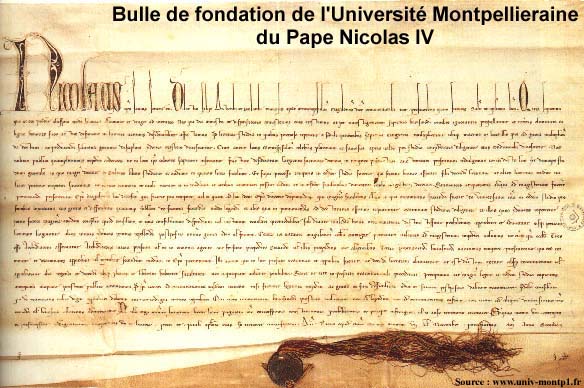Between 1276 and 1281, Arnau de Vilanova lived in Valencia, where he owned properties and seemed to have solid roots. In 1281, King Peter II appointed him as his personal physician, perhaps thanks to the Bishop of Valencia, Jaspert de Botonac, to whom Arnau devoted an epistle against black magic. This, then, launched a new stage for him in Barcelona which would last until the king’s death in 1285. During this period, he studied Hebrew with Ramon Martí and translated Galen from Arabic to Latin. His translation of Avicenna might have dated from the same period, while his translation of Abu-l-Salt seems to be from an earlier date. Upon the death of the king, whom he had attended in illness until his passing, Arnau maintained ties with the new King Alphonse as his physician, but he returned to Valencia (between 1285 and 1290).
Between approximately 1290 and 1300, master Arnau served as professor of Medicine in Montpellier, at that time the most prestigious medical school in southern Europe soon after the university had been founded in 1289 as a merger of the preceding schools. Many of his medical works date from this period, some of them linked to teaching and others to reflection. They include commentaries on Hippocrates and Galen, an adaptation of Galen, treatises on theoretical medicine, works on pharmacology and books of aphorisms. In contrast, the majority of his works on practical medicine, which include some syntheses and specific writings, are impossible to date. Arnau’s major contribution consisted of not limiting himself to the texts used traditionally in teaching or to Arab medical encyclopaedias but instead to introducing what was called the “new Galen” teaching, made up of translations that were not yet known in European universities. The Arnaldian conception of medicine as a technique grounded upon the mediaeval sciences was far from a simple empirical practice, and yet at the same time preserved its autonomy from natural philosophy. This renewed Galenism in Montpellier was recognised and made official by the new curriculum approved by Clement V in 1309, with the advice of Arnau de Vilanova. Without a doubt, Arnau’s time in Montpellier left a large footprint which lasted until at least the 15th century.
